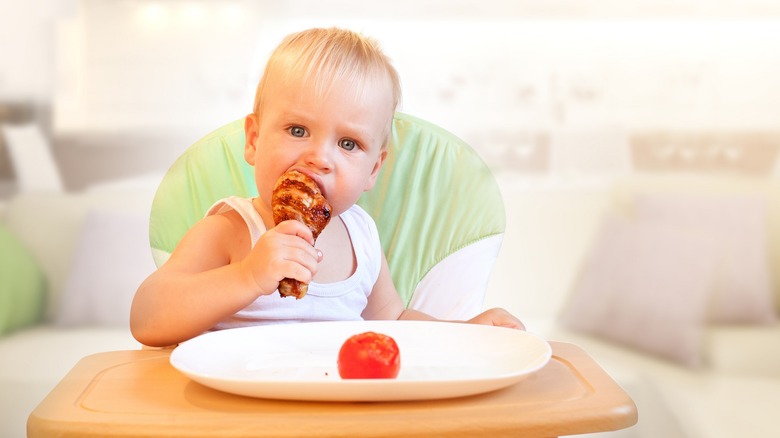Paleo Baby Food Exists And We're Seriously Disturbed
We thought (or rather hoped) the paleo trend was on its way out; but now, it seems the fad has consumed not only dieters and fitness enthusiasts, but parents of small children.
Future parents Serenity Heegel and Joe Carr recently founded Serenity Kids, an all-paleo baby food company selling puréed paleo food in disposable pouches. In addition to the toll these pouches could have on global warming and the environment, the implications for health-conscious and restrictive parents' diets for their children have the potential to be much more harmful.
The pouches are currently available for pre-order, selling at a price of $4.49 per pouch. Inside the layers of plastic is a short list of paleo-friendly ingredients including a vegetable starch, puréed meat, and other leafy vegetables. The ingredient list mirrors common paleo meals such as bacon, butternut squash, and kale; chicken, peas, and carrots; and beef, sweet potato, and kale. (Serenity Kids' food involves a ton of kale.)
The intentions of the couple are pure; they truly believe that feeding a child a baby food high in healthy fat and protein but relatively low in carbs is a good idea. The ingredients of the food are high-quality and are bred and planted by local, sustainably-minded farmers. It's true that feeding a baby these nutritious whole foods is a positive step towards a baby's development.
However, if there's anything a baby doesn't need, it's a restrictive diet. And the paleo diet, alongside its weird variations — like Whole 30 and other similar diets — is one of the most limiting there is. The diet abhors grains, dairy, beans, and other healthful foods that have become central parts of the modern diet.
The risk of restricting a child's food intake throughout their development is tenfold. Not only does it alienate children from their peers, it also creates a negative food mindset that has the potential to later grow into binge-eating behaviors, weight sensitivity, and restrictive eating disorders.
"Parents' use of restrictive feeding practices is counterproductive," said the results of one study. Another study found a parent's control over food and diet to result in higher levels of body dissatisfaction for their children. And body dissatisfaction, as we know, can lead to a disordered relationship with eating and food — as well as poorer health outcomes in the long run.
In a 2000 study, researchers concluded that overweight children aged 5 to 7 were more likely to indulge in what they call "eating in the absence of hunger" if they were under the influence of food restriction from their parents. Children who felt restricted at home ate more of these foods at school — and also reporting more intense feelings of shame and unhappiness with their eating.
While the distributors of these paleo products are not instructing parents to feed their babies an all-paleo diet, the implication is there — their criticism of other, less restrictive types of baby foods implies that these "clean" foods are morally superior to baby foods containing more sugars and carbohydrates. Sugars and carbohydrates, however, are essential for babies' development.
The Institute of Medicine recommends 95 grams of carbohydrates per day for infants 7 to 12 months of age. Carbohydrates are babies' main source of energy, which they need with all that growing, walking, and talking they're learning to do.
If you're feeding your baby primarily through these pouches, you would need at least 8 of these pouches per day to meet this carb recommendation, sending your baby way over the limit of fats, proteins, and calories before you even came close. Again, though the distributors don't recommend only feeding them these foods, the implication that these diets are superior is there. Babies on low-carb? Bad idea.
While these pouches could be cool for a snack or two throughout the day, we don't advise relying on paleo foods for a child's growth. Alternatively, here are some of the healthiest and unhealthiest foods for your baby.
